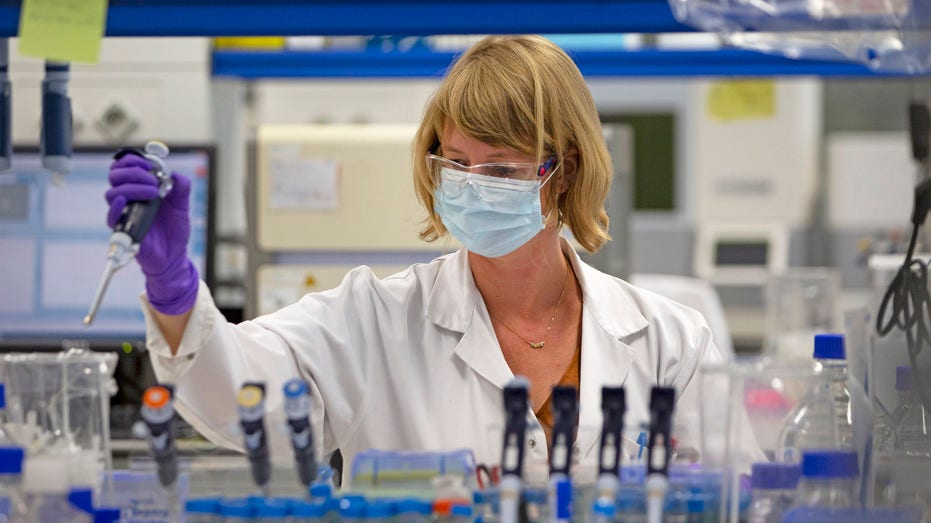How AI can speed up clinical trials
Clinical trials can take years and millions of dollars to comeplete, but only 14% of drugs that enter trials will get FDA approval
Artificial intelligence is on track to significantly change the health care industry.
AI is already being used in labs and hospitals to speed up clinical trials.
The average clinical trial process takes years to complete, costs hundreds of millions — if not billions— of dollars, and only 14 percent of drugs that enter clinical trials will get approval from the Food and Drug Administration, according to an MIT Sloan study published in 2018.

Abbott scientist creates SARS-CoV-2 IgG kit samples to run on its ARCHITECT i1000SR and i2000SR lab instruments. (Credit: Abbott Labs)
AI is helping companies and organizations use software that enables faster and more accurate collection of data, Dave Anderson, a spokesperson for AI software company Dynatrace, told FOX Business.
HOW ARTIFICIAL INTELLIGENCE IS SHAPING THE FUTURE OF SOCIETY
| Ticker | Security | Last | Change | Change % |
|---|---|---|---|---|
| DT | DYNATRACE INC. | 33.71 | +0.24 | +0.72% |
Machine-learning technology can accelerate time-to-market speeds, or the amount of time it takes between the conception of a product idea and the sale of that product, for vaccines and therapeutic drugs by up to 300 percent, Anderson said.
Typical drug experiments usually require microscopy snapshots of every reaction that happens when a cell representing a certain disease or illness is exposed to a number of different compounds; these trials can generate hundreds of millions of snapshots.
AI IDENTIFIED CORONAVIRUS BEFORE IT SPREAD. HERE'S HOW IT CAN CONTAIN FUTURE CONTAGIOUS VIRUSES
By using AI, scientists can predict how cells will react based on recycled snapshots rather than take new snapshots for every different cell-compound reaction, according to a blog post from Johnson & Johnson, which is currently developing a coronavirus vaccine. The blog post noted that AI can make the drug discovery process 250 times more efficient.
| Ticker | Security | Last | Change | Change % |
|---|---|---|---|---|
| JNJ | JOHNSON & JOHNSON | 240.00 | +2.26 | +0.95% |
Dynatrace recently partnered with global health care company ERT, which develops software for clinical trials, to help build its software development and IT operations (DevOps) processes.
"[ERT] went from releasing a new application every six weeks to every two weeks," Anderson told FOX Business.
J&J BEGINS CLINICAL TRIAL OF SINGLE-DOSE CORONAVIRUS VACCINE
In the past, he said, when problems within clinical trials occured, teams would have to look across their infrastructure and applications to find out what causes problems, which "can take teams offline for a significant amount of time."

A lab technician works during research on coronavirus, COVID-19, at Johnson & Johnson subsidiary Janssen Pharmaceutical in Beerse, Belgium, Wednesday, June 17, 2020. (AP Photo/Virginia Mayo)
AI technology essentially does three things for the clinical trial process: Makes it faster, more reliable and more secure, enabling researchers to allocate their time on the most important aspects of the trial that require human attention, Anderson explained.
He added that an AI system can quickly determine which line of code or device has caused a problem within a clinical trial when it occurs so researchers can focus their time and effort on other matters.
SCIENTISTS GET CLOSER TO BLOOD TESTS FOR ALZHEIMER'S DISEASE
"It provides the assistance," Anderson said. "It's providing the intelligence that we, as humans, aren't able to [obtain] because we are can't crunch that amount of information and come up with a solution."
In terms of the coronavirus pandemic, all aspects of everyday life have shifted toward more technologically advanced operations, and these changes happened in record time out of desperation for companies and institutions to adapt.
GET FOX BUSINESS ON THE GO BY CLICKING HERE
"Everyone pivoted," Anderson said of the shift toward more advanced software during the pandemic. "I would expect that there will be support for utilizing an AI to help speed up the testing and improve workflow for people to be focused more on the time spent getting the software in the market ... [and] for the doctors to be able to utilize the information and hopefully cure [COVID-19]."
While no AI is the same, the ultimate goal of all machine-learning software is usually to speed up tedious tasks that, in the past, took humans a long time to complete even if they did not require a lot of brainpower. With AI, humans can distribute that time to tasks that do require human judgment.
CLICK HERE TO READ MORE ON FOX BUSINESS




















